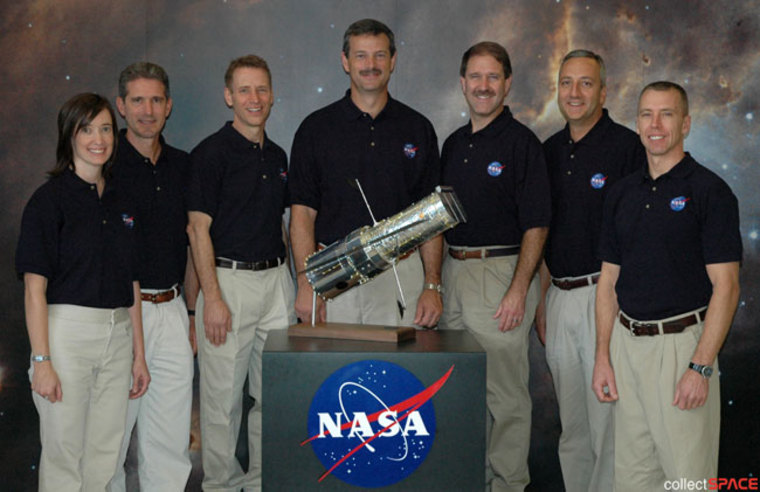Seven NASA astronauts are eagerly looking forward to a risky, but pivotal, shuttle flight to the Hubble Space Telescope this fall.
Veteran shuttle commander Scott Altman and his crew are preparing to launch in early October aboard the Atlantis orbiter on what is expected to be NASA's final service call on the iconic space observatory. The telescope passed its 100,000th orbit around Earth on Monday.
"What we want to do, though, is refurbish the Hubble so that it can operate as long as possible," Altman said during a series of NASA interviews released on Monday. "We're going to add some new instruments ... and then we're going to go in and kind of do internal surgery on some instruments that are already in the telescope."
Joining Altman on the mission to Hubble will be shuttle pilot Gregory C. Johnson, mission specialist Megan McArthur and spacewalkers Andrew Feustel, Michael Good, John Grunsfeld and Michael Massimino. With the exception of Hubble flight veterans Altman, Grunsfeld and Massimino, the rest of Atlantis's astronauts are making their first spaceflight.
But their mission is not without risk. Unlike all of NASA's shuttle missions since the 2003 Columbia tragedy, Atlantis is not headed for the International Space Station, where astronauts can take refuge and await rescue if their shuttle's heat shield is critically damaged.
The Hubble telescope circles the Earth in a higher orbit and different inclination than the space station, so Atlantis astronauts will not be able to reach the orbital laboratory if the shuttle is damaged.
Instead, NASA is priming a second space shuttle, Atlantis's sister ship Endeavour, and a four-astronaut crew for a rescue mission that the agency hopes it will never need. Altman and his crew will carry 25 days' worth extra of food and other supplies along with Hubble's new instruments as a precaution in case they should need an orbital rescue.
Under the plan, Endeavour would rendezvous with Atlantis within a 25-day window, grapple the orbiter with its robotic arm, and then astronauts would stage a series of spacewalks to transfer from the stricken ship. The return trip aboard Endeavour would be a bit cozy, with 11 astronauts in a vehicle that has at most hosted eight, the astronauts said.
"The whole concept of going somewhere where you don't have a place to shelter, like the space station, was a little different," Altman said, adding that some dedicated engineers came up with what he believes is a good contingency plan. "It's a very low probability of an event, but I'm glad that there's a relatively robust plan to deal with it if it did happen."
Hubble's coming overhaul
NASA initially canceled Atlantis's STS-125 mission to Hubble after the tragic 2003 loss of Columbia and its seven-astronaut crew. It revived the service call, first with a robotic mission and later with a crewed flight in 2006, following widespread disapproval from scientists and the public.
Despite the added risk of flying to the space telescope with out the space station as a safe haven, Atlantis astronauts said their flight is more than worth it. The new mission, NASA's fifth and last shuttle flight to Hubble since its April 1990 launch, is expected to extend the telescope's life through at least 2013 and leave it more powerful than ever before.
"The Hubble Space Telescope is more than remarkable," said Grunsfeld, an astronomer-turned-astronaut who is making his fifth career spaceflight and third visit to the orbital observatory. "It has answered just so many of those fundamental questions that people have been asking about the cosmos since people were able to ask questions."
Grunsfeld and his fellow spacewalkers Massimino, Feustel and Good will perform five back-to-back spacewalks to replace Hubble's batteries and gyroscopes, attach docking equipment, fix equipment never designed for in-space repairs, and install a new camera and other instruments. McArthur will wield Atlantis's robotic arm to grapple Hubble so astronauts can begin their orbital work.
"I think it will be a pretty special moment for all of us," McArthur said of leaving Hubble after the service call is complete. "I don't really know how that's going to feel."
